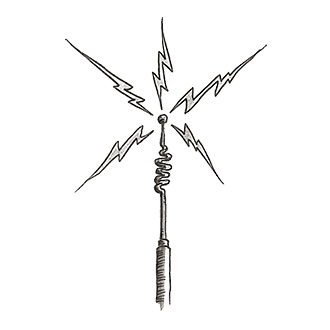
Related Questions
- Can we track the whereabouts of our dog using a passive microchip?
- Can brain waves interfere with radio waves?
- Can portable electronic devices (like my phone) be recharged wirelessly?
- Could a GPS device reveal my location to others?
- What is cloud computing?
- Are cell phone conversations stored somewhere and are they retrievable?
- Why don’t cell phones have retractable antennas anymore?
- Will we ever run out of music?
- Can my Internet connection be “tapped” like a phone line?
How does the Internet work?
Kind of like the post office, only bigger…
By Jason M. RubinSome people talk about cloud computing all the time, but they have their heads in the clouds if they think online information — web pages, music files, videos, and the vast seas of images and data — floats about magically in the ether, miraculously channeled through our laptops and smart phones. The Internet is not a magical cloud, explains Devavrat Shah, Jamieson Associate Professor in MIT’s electrical engineering and computer science department. It is a decidedly real collection of wires, optical fibers, electromagnetic waves, computers, and data centers.
Understanding email is a good first step, Shah says. “A suitable analogy is the postal service. It uses an addressing system that enables a letter to be delivered to a specific place. The Internet does the same thing with emails. An email account is a specific unduplicated address.” There is, for example, only one askanengineer@mit.edu email address on the whole Internet.
When it comes to Facebook, Google, Netflix, or any other web destination, the situation is not so different. Facebook, for example, is a “virtual place,” Shah says, and its address is expressed as an URL or a uniform (or universal) resource locator. When you type the URL of someone’s FB fan page, or your own page, into your web browser, the Internet takes you to that exact location — or, more accurately, it delivers that Facebook location to you by using a network directory service called the Domain Name System (DNS). Hosting more than a billion users, the Facebook you see on your computer actually lives on many servers in many different data centers.
Searches, Shah explains, are a little more complicated. “Often, when we use the Internet we don’t exactly know what we’re looking for. So we send a request through a search engine, such as Google.” Search engines keep track of much of what exists on the Internet, so when you ask them questions, they look for an answer — or at least for pages that have some of the same words on them as are in your question. When Google thinks it has an answer or a match, it lets you know which URL you should visit for an answer.
“The Internet is a thing of logic,” Shah says. “It connects users to users, and also users to end-hosts, which could be served using data centers. Its infrastructure is specifically designed with physical links formed of wireless connections, or Ethernet cables that feed to fiber cables, which could be connected to a satellite and so on.”
A practical explanation for a complex system, one which hopefully doesn’t cloud the issue.
Thanks to 6-year-old Edward from Providence, R.I., for this question.
Posted: October 30, 2012